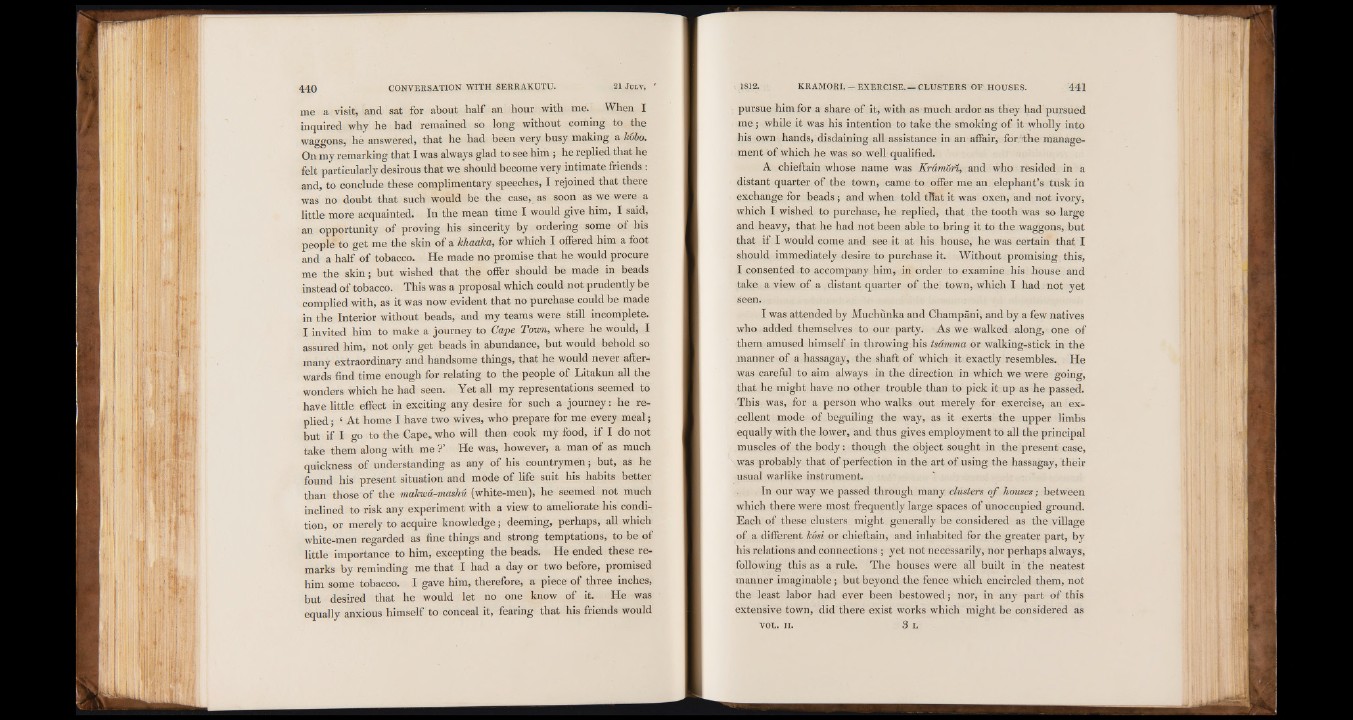
me a visit, and sat for about half an hour with me. When I
inquired why he had remained so long without coming to the
waggons, he answered, that he had been very busy making a lcobo.
On my remarking that I was always glad to see him ; he replied that he
felt particularly desirous that we should become very intimate friends :
and, to conclude these complimentary speeches, I rejoined that there
was no doubt that such would be the case, as soon as we were a
little more acquainted. In the mean time I would give him, I said,
an opportunity of proving his sincerity by ordering some of his
people to get me the skin of a khaaka, for which I offered him a foot
and a half of tobacco. He made no promise that he would procure
me the skin; but wished that the offer should be made in beads
instead of tobacco. This was a proposal which could not prudently be
complied with, as it was now evident that no purchase could be made
in the Interior without beads, and my teams were Still incomplete.
I invited him to make a journey to Cape Town, where he would, I
assured him, not only get beads in abundance, but would behold so
many extraordinary and handsome things, that he would never afterwards
find time enough for relating to the people of Litakun all the
wonders which he had seen. Yet all my representations seemed to
have little effect in exciting any desire for such a journey: he replied
; ‘ At home I have two wives, who prepare for me every meal;
but if I go to the Cape, who will then cook my food, if I do not
take them along with me ?’ He was, however, a man of as much
quickness of understanding as any of his countrymen; but, as he
found his present situation and mode of life suit his habits better
than those of the makwd-masM (white-men), he seemed not much
inclined to risk any experiment with a view to ameliorate his condition,
or merely to acquire knowledge j deeming, perhaps, all which
white-men regarded as fine things and strong temptations, to be of
little importance to him, excepting the beads. He ended these remarks
by reminding me that I had a day or two before, promised
him some tobacco. I gave him, therefore, a piece of three inches,
but desired that he would let no one know of it. He was
equally anxious himself to conceal it, fearing that his friends would
pursue him for a share of it, with as much ardor as they had pursued
m e; while it was his intention to take the smoking of it wholly into
his own hands, disdaining all assistance in an affair, for the management
of which he was so well qualified.
A chieftain whose name was Kramori, and who resided in a
distant quarter of the town, came to offer me an elephant’s tusk in
exchange for beads; and when told tffat it was oxen, and not ivory,
which I wished to purchase, he replied, that the tooth was so large
and heavy, that he had not been able to bring it to the waggons, but
that if I would come and see it at his house, he was certain that I
should immediately desire to purchase it. Without promising this,
I consented to accompany him, in order to examine his house and
take a view of a distant quarter of the town, which I had not yet
seen.
I was attended by Muchunka and Champani, and by a few natives
who added themselves to our party. As we walked along, one of
them amused himself in throwing his tsamma or walking-stick in the
manner of a hassagay, the shaft of which it exactly resembles. He
was careful to aim always in the direction in which we were going,
that he might have no other trouble than to pick it up as he passed.
This was, for a person who walks out merely for exercise, an excellent
mode of beguiling the way, as it exerts the upper limbs
equally with the lower, and thus gives employment to all the principal
muscles of the body: though the object sought in the present case,
was probably that of perfection in the art of using the hassagay, their
usual warlike instrument.
In our way we passed through many clusters of homes; between
which there were most frequently large spaces of unoccupied ground.
Each of these clusters might generally be considered as the village
of a different kosi or chieftain, and inhabited for the greater part, by
his relations and connections ; yet not necessarily, nor perhaps always,
following this as a rule. The houses were all built in the neatest
manner imaginable; but beyond the fence which encircled them, not
the least labor had ever been bestowed; nor, in any part of this
extensive town, did there exist works which might be considered as
VOL. II. 8 L